Failed Root Canal
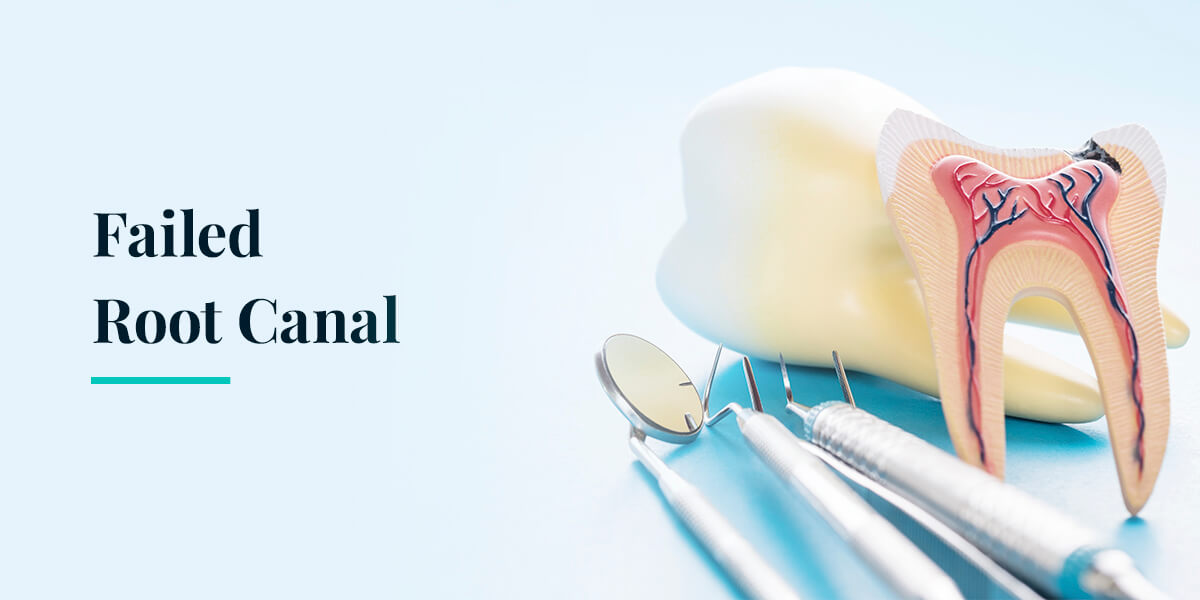
- What Is a Failed Root Canal?
- What Are the Symptoms of a Failed Root Canal?
- Why Do Root Canals Fail?
- Midtown Endodontist NYC
When infection or decay damages a tooth, it may require a root canal to remove the damaged nerve and pulp. Root canals are often performed when your infected tooth displays symptoms, such as severe pain, that demand immediate emergency root canal treatment.
Root canals are one of the most common endodontic procedures. When performed successfully, they can protect your tooth from sustaining another infection. While not all root canal therapy works, you can explore options to support healing if you have had a failed root canal. We may be able to save your tooth.
What Is a Failed Root Canal?
Root canals fail when the original treatment does not remove all the infection, or the tooth becomes infected again. It can take weeks, months or even years for a failed root canal to surface. You may recognize the symptoms of infection, such as tooth discoloration, pimples on the gum or swelling because you already went through root canal treatment once.
If you do not seek treatment again, the infection may spread to other teeth. Saving your tooth becomes more challenging, but it can be done if you immediately go to your endodontist.
What Happens If a Root Canal Fails?
You may not detect a root canal failure at first. Some patients show no symptoms of a failed root canal, while others’ symptoms may look different than they did before the first root canal. No matter the signs, infection of the pulp cannot heal on its own — it requires intervention and treatment.
What Are the Symptoms of a Failed Root Canal?
The signs of a root canal failure may include:
- Tooth sensitivity or root canal pain when biting down.
- A pimple or boil on the jaw.
- Discoloration of the tooth.
- Pain from pressure in tooth with root canal
- Tenderness in the gum tissue near where the root canal was performed.
- Pain in the tooth you had treated.
- Presence of pus-filled abscesses near the treated tooth.
- Facial or neck swelling.
- Swelling near the affected tooth.
Remember that a bit of pain following a root canal is normal — you may feel discomfort for several days afterward.
You should become more concerned about pain that continues long after that, impacting your daily life and making you reluctant to partake in regular activities, such as eating and chewing.
Your endodontist may confirm the root canal failure by ordering a dental X-ray. A failed root canal will not get better without treatment. It is important to get a diagnosis for your ailment so you can pursue the proper remedy and receive the endodontic care you require.
How X-Rays Are Used to Identify Failed Root Canals
Most of the time, the tenderness, discomfort or pain following a root canal will show that something isn’t right. Other times, the symptoms are more subtle.
While root canals are common and have a high success rate, any dental procedure has a risk of complications. Because root canal failure can sometimes be hard to see with the naked eye, radiographs can help endodontists diagnose and treat a failed root canal. With radiographs, your endodontist will see your treatment progress and if there are any issues inside your tooth structure or surrounding the root.
An x-ray will help them examine the dental pulp, periodontal ligament and bone surrounding your tooth. Checking if these areas are infected or inflamed will help them determine whether you are healing or experiencing a failed root canal.
If the root canal wasn’t successful, the radiographs can guide your endodontist to determine the best course of action and treatment plan. This tool is an integral part of follow-up appointments to ensure treatment success.
What Is the Failure Rate of Root Canals?
Only a small number of root canals fail. The procedure has a success rate of 86% to 98%, which means only 2-14% fail. We find that a large majority of our patients do not have any trouble with their root canals. The low failure rate speaks to the overall effectiveness of this treatment method.
Why Do Root Canals Fail?
Root canals may fail due to error on the part of the dentist, a structural abnormality or unexpected development. For example, a dentist could delay the placement of the dental crown or miss one of your canals.
Other culprits of a failed root canal include traumatic dental injuries, an obstruction or salivary contamination.
- Traumatic dental injuries: A fracture or crack in the affected tooth can lead to infection in the root.
- Root canal structure: Some patients have complex roots, such as a curved or narrow canal. You may even have more canals than the dentist anticipated. If the dentist misses one of these canals or did not clean it out right, you may develop an infection.
- Obstruction: Something may have gotten in the way of the dentist’s effort to clean the affected canal. Obstructions may include another tooth, filling material or sealants that were applied improperly.
- Salivary contamination: Your saliva allows bacteria to grow throughout your mouth. If the inside of your tooth becomes contaminated by saliva and that bacteria, a second infection may occur.
- Dental crown placement: Your dentist may have delayed the placement of a dental crown following your root canal treatment, which provides time for an infection to develop. If the crown is loose or broken, it could expose the tooth to another infection.
Is the Dentist Responsible for a Failed Root Canal?
Your dentist may be responsible for a bad root canal treatment. It ultimately depends on why your root canal failed. If your dentist did not provide an acceptable standard of treatment or live up to their duty-of-care mandate, you might incur unnecessary pain and suffering with root canal complications. A negligent provider may be guilty of malpractice.
However, a bad root canal is often not the fault of your dentist. If they made every good faith attempt to treat your tooth and it did not work, you cannot hold them responsible.
Going to an endodontist for a root canal is a better option than seeing a general dentist. Endodontists specialize in root canals and perform many more than dentists, giving them more experience and greater expertise.
Can a Failed Root Canal Be Fixed?
Yes, a failed root canal can be fixed.
Your NYC endodontist has several options, including root canal retreatment, extraction and apicoectomy. Retreatment has the highest success rate for failed root canals and is the most common treatment option. Your endodontist will treat the infection, then fill and seal it again to preserve the integrity of the tooth.
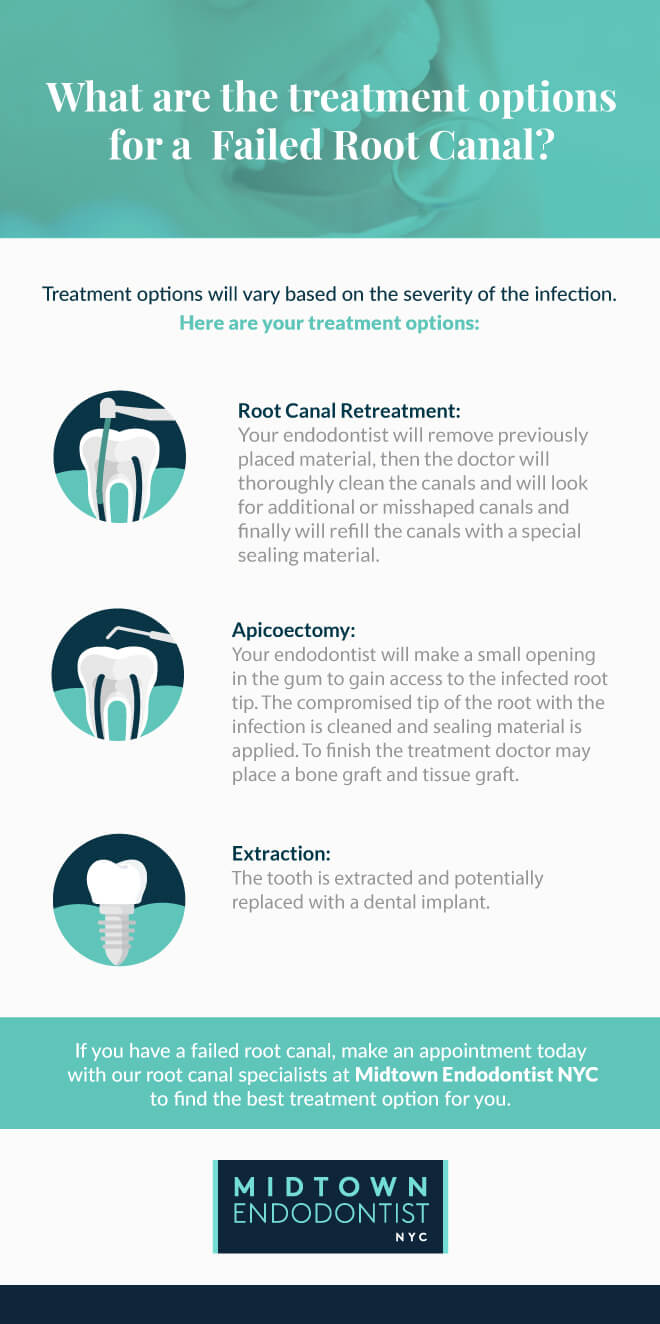
An extraction and apicoectomy involve:
- Extraction: When retreatment fails, a tooth may be extracted. You could need a dental implant to fill the space.
- Apicoectomy: During this dental treatment, your endodontist partially or completely removes the tip of the root and applies a new seal.
Contact Midtown Endodontist NYC to Treat a Root Canal Failure
Root canals can fail,
but we are here to help. Make an appointment today with our root canal specialists at Midtown Endodontist NYC. We can evaluate root canal treatment failures and help save your natural tooth if retreatment is an option. Let us offer the care you need. If you are experiencing tooth pain after a failed root canal procedure, schedule an appointment with our highly trained endodontist today. Give us a call at (347) 708-8795.
 Our Providers
Our Providers
 Blog
Blog
 Contact us
Contact us
 Endodontics
Endodontics
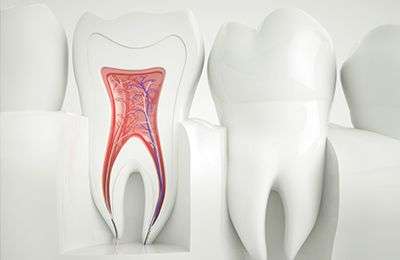 Root Canal Treatment
Root Canal Treatment
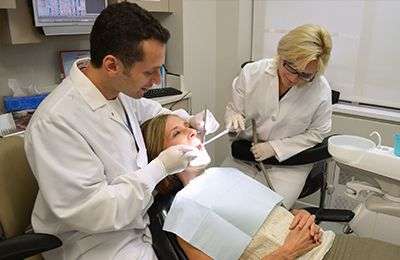 Emergency Root Canal
Emergency Root Canal
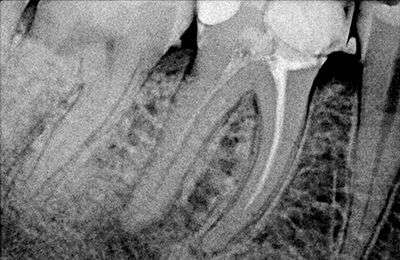 Root Canal Retreatment
Root Canal Retreatment
 Complimentary Teeth Whitening
Complimentary Teeth Whitening
 Teeth Whitening
Teeth Whitening





